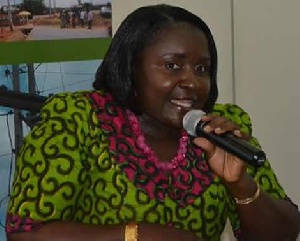Ghana has a good number of legislations but fails to enforce them, and so corruption is having a field day, Linda Ofori-Kwafo, the Executive Director of Ghana Integrity Initiative (GII), has said.
“Issues of corruption come up every time, whether in procurement, education, health or any other. What we need to do is use the existing laws to prevent corruption from happening,” she said at the launch of a report titled “A Stakeholder Perspective on Corruption Risks in Ghana’s REDD+” in Accra.
“In Ghana we put in place institutions to fight corruption and we have the laws to fight corruption but then we have to enforce the laws. It is the enforcement of the laws that is weak. Nobody gets sanctioned or too many people do not get sanctioned and go scot-free,” she added.
REDD+ stands for countries' efforts to reduce emissions from deforestation and forest degradation, and foster conservation, sustainable management of forests, and enhancement of forest carbon stocks. The basis behind REDD+ is that developing countries would be financially compensated for reducing emissions.
Touching on the recommendations from the report, Mrs. Ofori-Kwafo said that if Ghana is unable to enforce legislations or strengthen the law enforcement mechanisms “we are likely to have corruption taking place as far as Ghana’s implementation of the REDD+ projects are concerned.”
The report’s objective is to document stakeholder perception on the likelihood or potential of specific corrupt practices occurring in the forestry sector and the conditions that may influence potential outcomes, as well as risks they may pose to Ghana’s REDD+ implementation process.
The study, which used questionnaire survey, focused group discussions and key informant interviews to collect data, covered three districts in the Brong Ahafo, Ashanti and Northern regions with national level stakeholders in Accra and Kumasi engaged to gain broader perspective on corruption in the forestry sector which could be inherited by REDD+.
The results of the study revealed that forest law enforcement, timber harvesting operations, and monitoring of forestry activities are the critical areas where corruption is likely to be widespread in the forestry sector.
With respect to possible corrupt practices associated with law enforcement in the forestry sector, 40percent of respondents indicated that bribery of forest officers by illegal loggers is the most serious corrupt practice, followed by political and traditional authority interference in the arrest and prosecution of offenders of forestry laws.
Also, 37percent of respondents perceive bribery of the forest patrol team to be the most serious corrupt practice associated with monitoring of forestry activities. Also 55percent of respondents associated the most serious corrupt practices that is likely to be related to reforestation, to the award of contracts, followed by procurement of materials and supplies, and then payment of wages of plantation workers.
In identifying actors who are likely to commit corrupt practices in the forestry sector, majority of the respondents mentioned politicians and law enforcement agents as the top two actors who are extremely likely to engage in corrupt practices.
Dr Winston Asante, Lecturer, Kwame Nkrumah University of Science and Technology, who presented the report, recommended that efforts should be made to strengthen the institutional mechanism of the forestry sector in a way that will ensure that the systems work, and the structures are able to provide resilience to undue political interference in technical issues in the sector.
“It states that REDD+ processes should continue to engage with the Forest Law Enforcement Government Trade processes, in order to benefit from the generally improved governance regime that would result whereas advocacy measures on REDD+ corruption risks should be synergised with the activities of Forest Watch Ghana.”
The meeting brought together Stakeholders from Institutions like the Ministry of Lands and Natural Resources, Forestry Commission Ghana REDD+ Secretariat, Ministry of Environment, Science, Technology and Innovation and the Environmental Protection Agency.
General News of Monday, 19 September 2016
Source: B&FT













